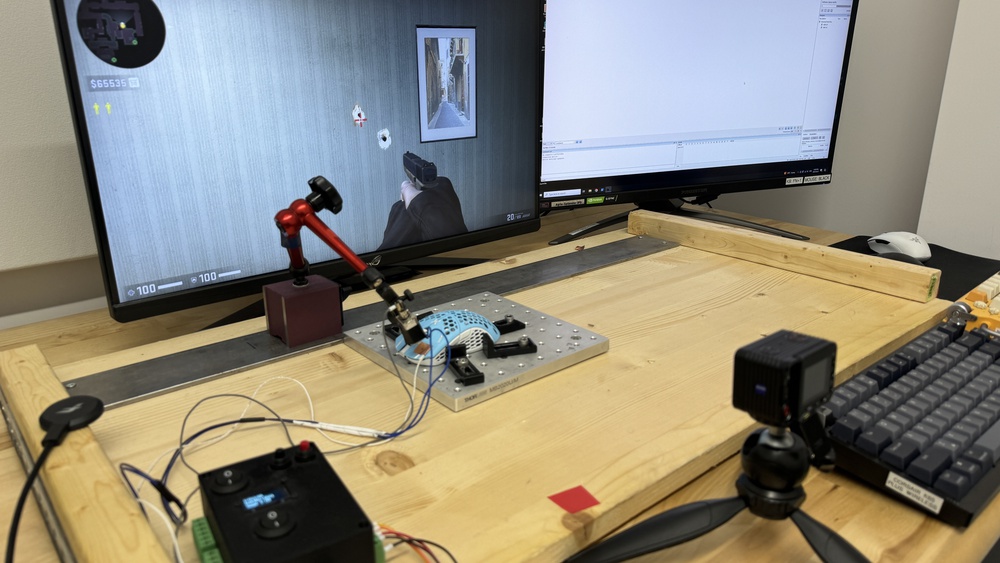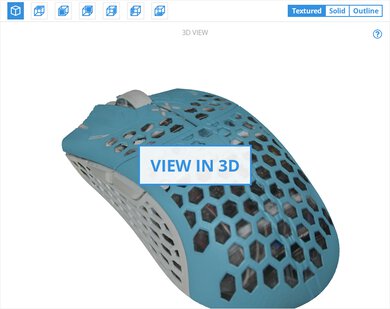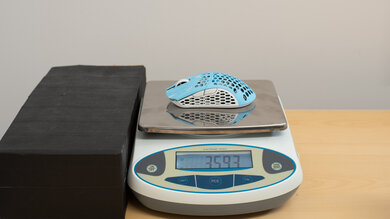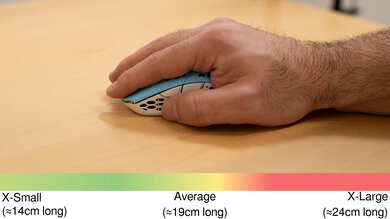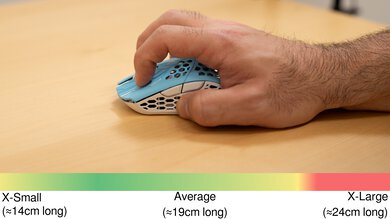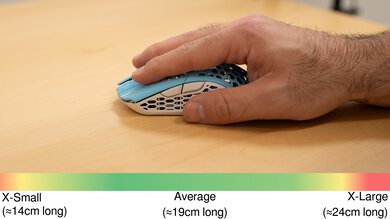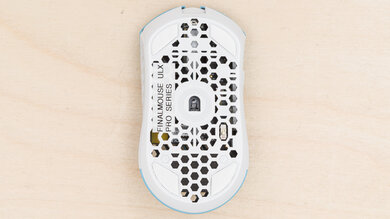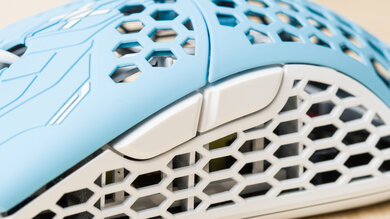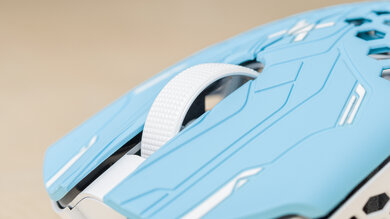The Finalmouse ULX Pro Series is a lightweight wireless gaming mouse. The Tarik edition that we bought and tested is the first release of the limited Pro Series lineup based on Finalmouse's UltralightX. It features the same symmetrically shaped body, PixArt PAW3395 sensor, and carbon fiber composite construction but features a new soft touch "ProGrip" coating. It also uses Huano Blue Shell Pink Dot switches for its main click buttons and supports a maximum polling rate of 8000Hz.
You can buy this mouse in three sizes: small (Cheetah), medium (Lion), and large (Tiger). We bought and tested the small (Cheetah) size variant. For more details, see the Differences Between Variants section.
Note: The ULX Pro Series is being released in limited edition runs. The Tarik edition we bought is sold out at the time of publishing, so you can only purchase one from third-party resellers. Finalmouse has teased that they'll release more ULX Pro Series limited edition models in the future.
Our Verdict
The Finalmouse ULX Pro Series is acceptable for work but isn't designed explicitly for this usage. That said, it's very lightweight and has a comfortable symmetrical shape. Unfortunately, while you can connect to it wirelessly with its USB receiver, it doesn't support Bluetooth or multi-device pairing. Also, while it has a web-based configurator, you can't remap buttons without third-party software. Lastly, the scroll wheel feels cheap and lacks helpful productivity features like L/R tilt inputs and free-scrolling.
-
Connects wirelessly with its 2.4GHz receiver.
-
Remarkably lightweight; less fatiguing to use for long stretches compared to heavier productivity mice.
-
Carbon fiber body is noticeably flexible.
-
Can't reprogram buttons without third party software.
-
Doesn't support Bluetooth; no multi-device pairing.
-
Scroll wheel lacks a free-scrolling mode and L/R tilt inputs.
The Finalmouse X Tarik ULX Pro Series is a remarkable FPS gaming mouse. Its carbon fiber composite body makes it remarkably lightweight and easy to move quickly and accurately. It also has incredibly low and consistent click latency and outstanding all-around sensor performance that's more than suitable for gaming at any competitive level. Unfortunately, it also suffers from some build quality issues. While its body is very strong, it's noticeably flexible. If you apply pressure to the underside, you can separate the side panel from the bottom panel. Also, all of the buttons feel fairly mushy and have a cheap feel. While these issues are noticeable, we don't expect them to impact your in-game performance negatively. For more details about these issues, see the Build Quality section.
-
Maximum wireless polling rate of 8000Hz.
-
Incredibly low and consistent click latency performance.
-
Outstanding all-around sensor latency and accuracy.
-
Carbon fiber body is noticeably flexible.
-
All buttons feel mushy; main click buttons have noticeable post-travel.
The Finalmouse ULX Pro Series is okay for MMO gaming but has fewer side buttons than a dedicated MMO gaming mouse, and you can't remap buttons without third-party software. That said, it's exceptionally lightweight and has incredibly low and consistent click latency and outstanding sensor performance, providing an exceptionally responsive-feeling in-game experience.
-
Incredibly low and consistent click latency performance.
-
Outstanding all-around sensor latency and accuracy.
-
Carbon fiber body is noticeably flexible.
-
All buttons feel mushy; main click buttons have noticeable post-travel.
-
Can't reprogram buttons without third party software.
-
Significantly fewer side buttons compared to dedicated MMO gaming mice.
The Finalmouse ULX Pro Series delivers superb raw performance. Its click latency is incredibly low, and the sensor latency and accuracy are outstanding. This mouse also supports a maximum wireless polling rate of 8000Hz, delivering slightly better and more consistent overall performance over a standard 1000Hz polling rate. However, using higher polling rates also requires considerable CPU resources and consumes battery power much more quickly.
-
Maximum wireless polling rate of 8000Hz.
-
Incredibly low and consistent click latency performance.
-
Outstanding all-around sensor latency and accuracy.
- 6.3 Work
- 9.4 Video Games (FPS)
- 6.7 Video Games (MMO)
- 9.6 Raw Performance
Changelog
-
Updated Apr 16, 2025:
We've added a link to the recently reviewed Pwnage Trinity CF in the Build Quality section of this review.
-
Updated Jan 23, 2025:
We've added a link to the newly-reviewed Finalmouse UltralightX Competition in the Hand Size Recommendation section.
-
Updated Jan 20, 2025:
We've retested this mouse's Click Latency and Sensor Latency performance after the most recent round of firmware updates, which increased the maximum polling rate to 8000Hz. We've updated our scoring and included new text in several places, notably in the Sensor Latency section regarding a possible error with our initial results.
- Updated Aug 13, 2024: We've clarified some of our language in the Sensor Latency section regarding test with Motion Sync setting on and off. None of our results are changed.
- Updated Jul 22, 2024: We've added details about the new Aceu colorway to the Differences Between Sizes and Variants section.
Differences Between Sizes And Variants
The Finalmouse ULX Pro Series is available in three size variants: small (Cheetah), medium (Lion), and large (Tiger). We bought and tested the small (Cheetah) variant. Our unit's label is here. The label is mostly obscured because it's on the inside of the mouse and partially blocked by the honeycomb exterior. The model number on our unit is S/N: SA241704063.
We expect all size variants to perform similarly, and we expect most of our tests will broadly apply to all sizes except for obvious tests like Shape and Weight.
| Name | Color Options | Advertised Weight | Advertised Dimensions |
|---|---|---|---|
| ULX Pro Series (Cheetah/Small) | Tarik (Blue/White), Aceu (Red/White) | 31 g | 115.6 mm Length x 54.1mm Grip Width x 35.2mm Height |
| ULX Pro Series (Lion/Medium) | Tarik (Blue/White), Aceu (Red/White) | 35 g | 121.3 mm Length x 56.8 mm Grip Width x 37 mm Height |
| ULX Pro Series (Tiger/Large) | Tarik (Blue/White), Aceu (Red/White) | 37 g | 126 mm Length x 59 mm Grip Width x 38.4 mm Height |
Compared To Other Mice
The Finalmouse ULX Pro Series is a limited-edition lightweight wireless gaming mouse based on the Finalmouse UltralightX. It shares the same symmetrical shape, honeycombed carbon-composite shell, and PixArt PMW3395 sensor. The main differences are the new colorway, Huano Blue Shell Pink Dot switches for the main click buttons, and a soft-touch "Pro Grip" coating on the shell.
This mouse is incredibly lightweight and has outstanding performance. It competes with other flagship gaming mice like the Razer Viper V3 Pro, Logitech G PRO X SUPERLIGHT 2, and Ninjutso Sora V2. Unlike those mice, which all have solid plastic shells and minimal aesthetics, the ULX Pro Series has a distinctive colorway and a honeycomb outer shell, which leaves its inside exposed. While extremely lightweight, it suffers from flex and creaking throughout the body.
Unlike the UltralightX it's based on, Finalmouse has indicated that this mouse will be released in limited edition runs like previous Finalmouse models. We bought and tested the Tarik edition, but Finalmouse has teased that future pro models will be added to the lineup.
For more recommendations, see our picks for the best lightweight mouse, the best FPS mouse, and the best wireless gaming mouse.
The Finalmouse ULX Pro Series and the Razer Viper V3 Pro are both lightweight, high-performance wireless gaming mice. The Finalmouse is much lighter than the Razer due to its carbon-composite shell with honeycomb-shaped cutouts. However, the Razer has better build quality and a more traditional design with a solid plastic shell. Overall, the two mice perform similarly, but at the moment, the Razer supports a higher maximum polling rate of 8000Hz, while the Finalmouse's maximum polling rate is only 4000Hz.
The Finalmouse ULX Pro Series is an ultra-lightweight gaming mouse based on the Finalmouse UltralightX. The mice share the same sensor, 4000Hz maximum polling rate, and carbon composite body with honeycomb-shaped cutouts. The ULX Pro Series is a limited edition mouse released in different color variants than the UltralightX, while Finalmouse has committed to keeping the latter in continuous production.
The Finalmouse UltralightX Competition and the Finalmouse ULX Pro Series are very similar, limited edition versions in the same lineup. Both versions have a composite carbon fiber body with weight-saving honeycomb cutouts on the top and bottom. The UltralightX Competition has solid sides while the ULX Pro Series has cutouts on its sides. The UltralightX Competition has a slightly higher-quality scroll wheel encoder and only comes in a dark gray colorway, while the ULX Pro Series has several two-tone colorway options. Unfortunately, both have somewhat inconsistent build quality. We experienced a mushy button feel on the ULX Pro Series we tested and noticeable flexibility, popping, and creaking in the body of the UltralightX Competition we tested.
The Finalmouse ULX Pro Series and the WLmouse Beast X are ultra-lightweight wireless gaming mice with nearly identical symmetrical shapes. The Finalmouse is made of a carbon fiber composite and has slightly better raw performance. The WLmouse has a magnesium alloy body and has better overall build quality with fewer squeaks and less flexing. Additionally, the WLmouse is more readily available as it's in continuous production, whereas the Finalmouse was a limited run, and all units were sold at the time of writing.
The Finalmouse ULX Pro Series and the Endgame Gear OP1 8k are lightweight, high-performance gaming mice with symmetrical shapes. While the Endgame Gear is wired, the Finalmouse is wireless and weighs less. It features a honeycombed shell made of carbon composite material. The Finalmouse is flexible and makes creaking sounds under pressure, while the Endgame Gear feels rock solid. The two mice have outstanding performance overall, with the main difference being that the Endgame Gear supports a higher maximum polling rate of 8000Hz compared to the Finalmouse's lower 4000Hz polling rate.
The Finalmouse ULX Pro Series and the Ninjutso Sora V2 are lightweight wireless gaming mice with symmetrical shapes. The Finalmouse is marginally lighter thanks to its smaller size and carbon composite honeycombed shell. That said, the difference in weight is minor compared to the delta in build quality; the Finalmouse flexes and creaks with pressure, while the Ninjutso feels solid. The two perform very similarly, but the Ninjutso mouse has a maximum polling rate of 1000Hz while the Finalmouse has a maximum polling rate of 4000Hz.
Test Results
This mouse has a carbon fiber composite body with honeycomb cutouts on the sides, top, and bottom. The main click buttons have debossed/engraved linework patterns with contrasting color accents. There aren't any visible logos or RGB lighting on this mouse.
Note: The 3D scanning tool has difficulty accurately capturing depth inside this mouse's honeycomb body. As a result, the scan displays a blurry texture layer inside the mouse. That said, the scale and dimensions of this scan are still accurate and aren't affected by this minor visual error.
This mouse isn't designed specifically for portability. While it isn't very big, it's somewhat bulky and lacks a compartment for storing its USB receiver. Additionally, its honeycomb design leaves the interior more open to collecting dust and debris.
The Finalmouse ULX Pro Series has good build quality overall. The body is made of a carbon fiber composite material with a 'ProGrip' coating that feels grippy and high-quality. According to Finalmouse, their carbon fiber composite has a much better strength-to-weight ratio than conventional ABS plastic or magnesium alloy, as used on their previous lineup of Finalmouse Starlight-12 mice.
While this material feels very high-quality, it's also quite flexible. Applying intentional pressure anywhere on the mouse causes it to bend slightly and make audible creaking sounds, especially at seams when panels meet. Also, applying pressure to the bottom plate under the right-click button causes it to separate from the side panel. Here is a video of the issue.
The main click buttons are lightweight but somewhat mushy-feeling with significant post-travel. The side buttons also have significant play and feel mushy.
If you're looking for a similarly lightweight mouse with better build quality, check out the Pwnage Trinity CF.
We bought and tested the small (Cheetah) size variant of the Finalmouse ULX Pro Series. An additional medium (Lion) and large-sized (Tiger) variant is also available. For more details, see the Differences Between Variants section above.
Below, we've listed the advertised weights of all three sizes as found on this mouse's product page.
- Cheetah (Small): 31 grams
- Lion (Medium): 35 grams
- Tiger (Large): 37 grams
Finalmouse states that approximate weights are measured without skates and may have a variance of +-2g from unit to unit.
The Finalmouse ULX Pro Series has a fairly low-profile, symmetrical shape with a small, centered hump and gently sloping sides. Its shape is best suited for claw and fingertip grip types.
We bought and tested the small-size variant (Cheetah), which shares the same dimensions as the small-size Finalmouse UltralightX (Cheetah) and Finalmouse Starlight-12 Small and best suits medium- or small-sized hands.
There are two larger variants, the Lion (Medium) and the Tiger (Large). For more details about these size variants, see the Differences Between Variants section.
If you're interested in a separate limited edition of this mouse that has solid sides without any honeycomb cutouts, check out the Finalmouse UltralightX Competition.
This mouse has a 250mA battery. While Finalmouse doesn't specify a battery life estimate, they state that the "same technologies in the standard UltralightX are utilized in the ULX Pro Series" and that "gamers can expect to reach an average of two months without needing to charge their ULX" on the UltralightX's product page. We expect this estimate to be optimistic, assuming low daily usage and likely using a 1000Hz polling rate.
The battery life you can expect will depend highly on average daily usage and the polling rate you choose, as higher polling rate settings consume significantly more battery life. If you have a fairly high (5+ hours) of daily usage at polling rates higher than 1000Hz, we expect you may need to recharge your mouse as often as every few days.
If you have this mouse and want to share your experiences with its battery life, we'd love to hear from you in the comments.
This mouse includes a braided charging cable. It's quite stiff and drags somewhat on desks and mousepads. This cable is noticeably less flexible and made of a cheaper-feeling material than the cable included in other recent Finalmouse releases, like the cable included with the Finalmouse Starlight Pro - TenZ Medium.
This mouse's feet glide very easily on mousepads with only marginal felt friction when used directly on desks or harder mousepads. The feet have some sharp edges, but this doesn't noticeably add any drag due to the lightweight nature of this mouse. Third-party replacement feet are also available.
If you want to reprogram any of this mouse's buttons, you'll need to use third-party software, as the XPANEL web-based configuration client doesn't support button mapping.
There's a power switch on the bottom of the mouse.
The Finalmouse ULX Pro Series has exceptionally low and consistent click latency performance. It delivers an exceptionally responsive-feeling experience for playing games in any genre and at any competitive level.
We performed our click latency testing at a polling rate of 8000Hz.
The Finalmouse ULX Pro Series offers exceptional CPI performance. Its sensor delivers outstanding tracking accuracy, and the physical movements you make with your mouse translate extremely close to your cursor movements on-screen.
The Finalmouse ULX Pro Series provides outstanding sensor latency performance. The sensor quickly reacts when you move your mouse, and these movements very closely match the timing of the cursor movements you see on the screen.
We performed all tests with the polling rate set to 8000Hz and with Motion Sync disabled.
For comparison, we conducted additional testing of multiple polling rates. These results demonstrate very similar performance between 4000hz and 8000Hz settings, which we've also confirmed with other models in the wider UltralightX family, including the original Finalmouse UltralightX and the newer Finalmouse UltralightX Competition.
Note: During our initial testing on earlier firmware, when the mouse's maximum polling rate was 4000Hz, latency across all stages of movement—particularly the Delay to End of Movement—was significantly lower, resulting in a higher Sensor Latency score when we first published our review. However, we now suspect those results may have been inaccurate and are actively investigating the cause of the error.
While this mouse advertises a minimum lift-off distance of 1mm in the software, we found it to be 2.4mm in our testing. We retested this multiple times to verify but observed the same results.
When initially launched, this mouse supported a maximum polling rate of 4000Hz. More recent firmware updates have increased the maximum polling rate to 8000Hz.
Additionally, at launch, this mouse only supported five fixed CPI settings. The web-based configuration software now allows you to set custom CPI presets and make other adjustments, including polling rate and lift-off distance.
This mouse's scroll wheel operates quietly and feels reasonably precise, with defined notches between steps. However, the surface finish isn't very grippy compared to more textured or rubberized scroll wheel surfaces on many other gaming mice, including the Finalmouse Starlight-12 Poseidon Small. You may find the finish slippery, especially if your hands tend to sweat more.
The left- and right-click buttons, side buttons, and scroll wheel operate quietly and are unlikely to bother anyone around you.
The Finalmouse ULX Pro Series uses XPANEL, a web-based configuration client you can access from Finalmouse's website. This utility lets you choose between polling rates, lift-off distance options, and custom CPI settings. (Note that the software video tour only shows CPI presets available, as we recorded this video on earlier firmware before this option was available). You can also toggle Motion Sync and adjust the LED behavior on the wireless receiver dongle. You can also download a desktop version of the software for Windows or Linux.
Comments
Finalmouse ULX Pro Series: Main Discussion
Let us know why you want us to review the product here, or encourage others to vote for this product.
Update: We’ve removed the Canon imagePROGRAF PRO-300 from our Notable Mentions as it’s no longer available and made edits throughout for clarity.
What do you think of these changes? Let us know

